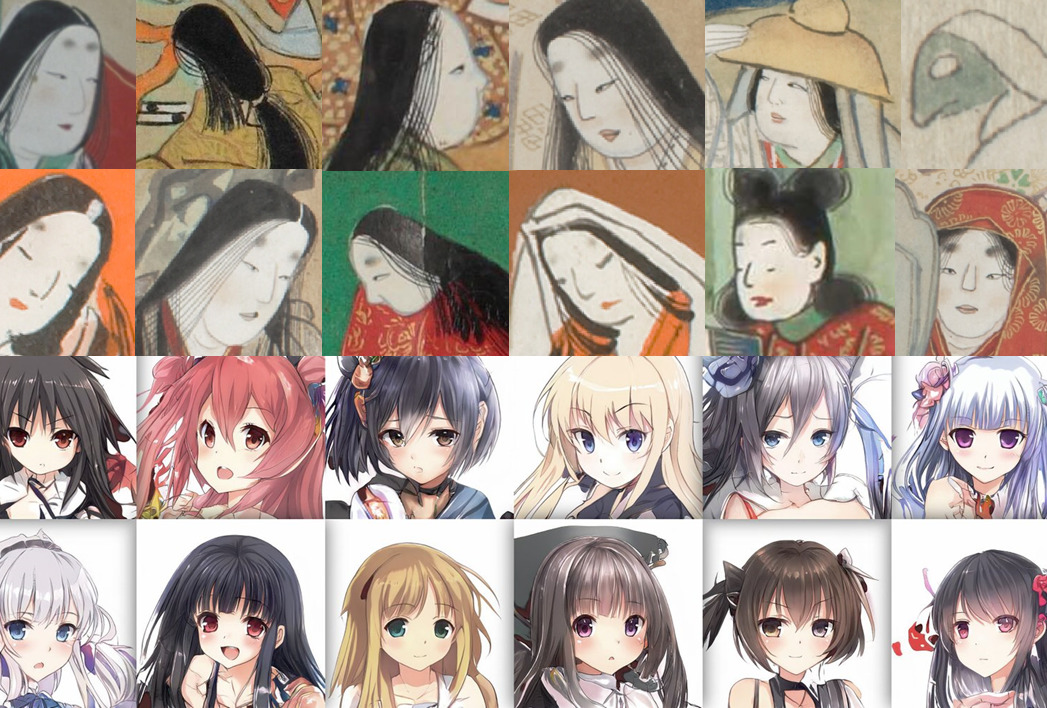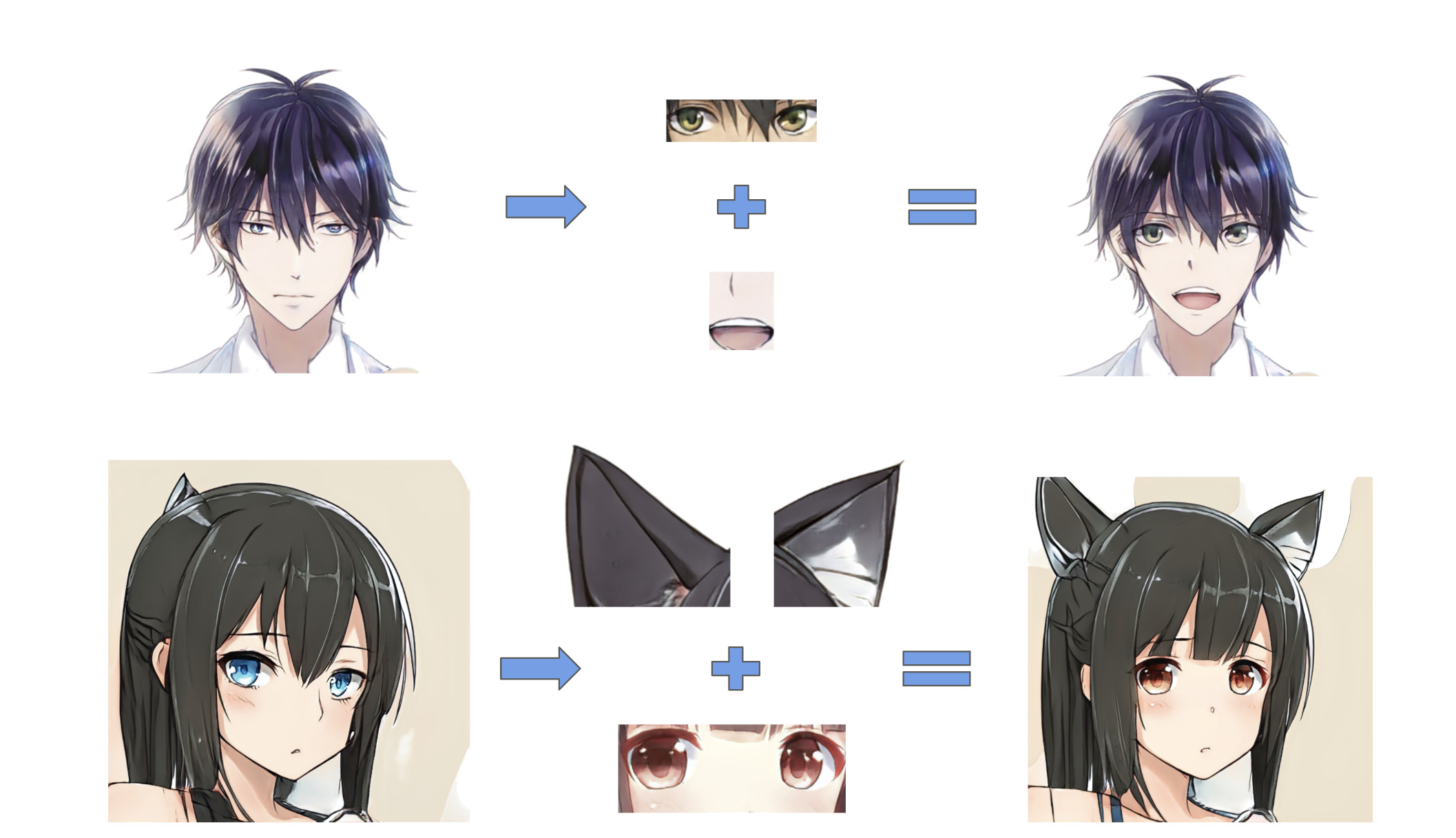[IMPORTANT NOTICE!]
The seminar will be hold online on August 5, 2020. Please sign up from the 12th CODH Seminar (Online) page.
【重要なお知らせ!】
このセミナーは2020年8月5日にオンラインで開催することになりました。事前登録は12th CODH Seminar (Online)のページからお願いします。
[IMPORTANT NOTICE!]
Due to the spreading status of Novel Coronavirus Infection, we decided to postpone the 12th CODH Seminar. On February 21, nothing will be held. We plan to have the seminar in the same format later this year. New date will be announced later. Thank you for your understanding.
【重要なお知らせ!】
新型コロナウイルス感染の状況を踏まえ、第12回CODHセミナーの延期を決定しました。2月21日には何も開催しません。今年中に同じ形式で改めてセミナーを開催したいと考えております。新しい日程は後日アナウンスいたします。ご理解をお願いいたします。
Theme

We welcome two distinguished guests, Yingtao Tian from Google Brain Tokyo, and Yanghua Jin from Preferred Networks, to discuss relationship between AI and culture, from Japanese art to anime, including topics such as new datasets, generative models and machine creativity.
Basic Information
| Date |
|
| Venue | 1208 Meeting Room (12F), National Institute of Informatics. Access to NII. |
| Fee |
Free Registration in advance is required. Capacity: 100 (Registration may be closed early) |
| Language |
English No translation to Japanese |
Program
| 13:30 | Open the venue | |
| 14:00-14:20 | "Collection of Facial Expressions" and "KaoKore Dataset": Data-driven art history research and possibility of collaboration with machine learning | Chikahiko Suzuki (ROIS-DS Center for Open Data in the Humanities / National Institute of Informatics) |
| 14:20-15:05 | KaoKore Dataset and its machine learning perspective | Yingtao Tian (Google Brain Tokyo) |
| 15:05-15:50 | Exploring Anime Characters Creation with Deep Learning | Yanghua Jin (Preferred Networks) |
| 15:50-16:30 | Discussion | Moderator: Tarin Clanuwat (ROIS-DS Center for Open Data in the Humanities / National Institute of Informatics) |
Registration
You are all invited, free of charge. Registration in advance is required using the following form.
Seminar is postponed. New date will be announced later.
Abstract and Bio
"Collection of Facial Expressions" and "KaoKore Dataset": Data-driven art history research and possibility of collaboration with machine learning
In my talk, I will explain “Collection of Facial Expressions (KaoKore)” and "KaoKore Dataset". KaoKore is a CODH project which collects images of faces from Japanese art works. This project aims to promote data-driven research in humanities, especially art history research field. I will introduce process of creating KaoKore and example of art history research using KaoKore. In the second half of my talk, I will explain “Kaoreko dataset” briefly. This dataset is rework of KaoKore in a machine learning friendly format. I would like to talk about expectations of collaboration between machine learning and art history research based on KaoKore dataset.
Chikahiko Suzuki (ROIS-DS Center for Open Data in the Humanities / National Institute of Informatics)
A Project Assistant Professor at the ROIS-DS Center for Open Data in the Humanities and National Institute of Informatics. After studying Art History, Cultural Resources Studies and Digital Humanities, his main research interest is in applying informatics and open data to humanities research fields. Currently, he is focusing on IIIF (international image interoperability framework).
KaoKore Dataset and its machine learning perspective
From classifying handwritten digits to generating strings of text, the datasets which have received long-time focus from the machine learning community vary greatly in their subject matter. This has motivated a renewed interest in creating datasets which are socially and culturally relevant, so that algorithmic research may have a more direct and immediate impact. One such area is in history and the humanities, where better machine learning models could help to accelerate research. Along this line, newly created benchmarks and models have been proposed for historical Japanese cursive writing. At the same time, using machine learning for historical Japanese illustrations and artwork has remained largely uncharted. In this talk, Yingtao would be presenting the proposed new dataset KaoKore, which consists of faces from Pre-modern Japanese Illustrations, as well as demonstrating its value as both a classification dataset as well as a creative and artistic dataset, which we explore using generative models. It is hoped that the presented work bridges the research of humanity and machine learning.
Yingtao Tian (Google Brain Tokyo)
Yingtao Tian is a Research Software Engineer in Google Brain Tokyo. Prior to that, he obtained his PhD at Stony Brook University in May 2019, advised by Prof. Steven Skiena. His research interests lie in generative models and representation learning, as well as their applications in natural language processing, knowledge base modeling, social network modeling, image generation and bioinformatics, and much more. His current focus concerns the intersection between generative models and agents interacting with external words, as well as bridging machine learning with humanity research.
Link: KaoKore Dataset

Exploring Anime Characters Creation with Deep Learning
Deep learning has shown great potentials of machine creativity. As a subarea of entertainment art, anime and manga have been a unique part of the Japanese economy and social culture. However, it takes tremendous efforts to master the skill of drawing, after which we are first capable of designing characters. In Preferred Networks, we are motivated to bridge the gap between amateurs and professional creators by adopting cutting-edge deep learning technologies. In this talk, I will present our recent efforts on exploring Japanese anime character creation with the help of machine creativity. More specifically, how we build practical systems to support amateurs to create their ideal anime characters and to automatically animate characters from a single illustration.
Yanghua Jin (Preferred Networks)
Yanghua Jin is a research engineer at Preferred Networks. Before that, he obtained an undergraduate degree in Computer Science and Engineering from Fudan University, Shanghai, China. His research interests include deep generative models and its application to Japanese animes and games. He founded the Crypko project to build real-world applications of anime deep generative models before joining Preferred Networks.
Link: Crypko
Past CODH Seminars
2024-03-04
21th CODH Seminar - Digital History: Concepts and Practices
2023-02-27
2023-03-01
2023-01-22
2022-07-01
2022-03-28
2021-07-29
2021-02-18
14th CODH Seminar - 100 Recipes for IIIF Curation Platform
2021-01-22
13th CODH Seminar - Present and Future of Historical Big Data Research
2020-08-05
12th CODH Seminar (Online) - AI for Culture: From Japanese Art to Anime
2020-02-21
12th CODH Seminar - AI for Culture: From Japanese Art to Anime
2019-09-25
2019-03-11
10th CODH Seminar - Document Analysis and Character Recognition
2019-01-08
9th CODH Seminar - Computer Vision with Limited Labeled Data
2018-11-22
2018-07-31
7th CODH Seminar - Manifold Mixup: Encouraging Meaningful On-Manifold Interpolation as a Regularizer